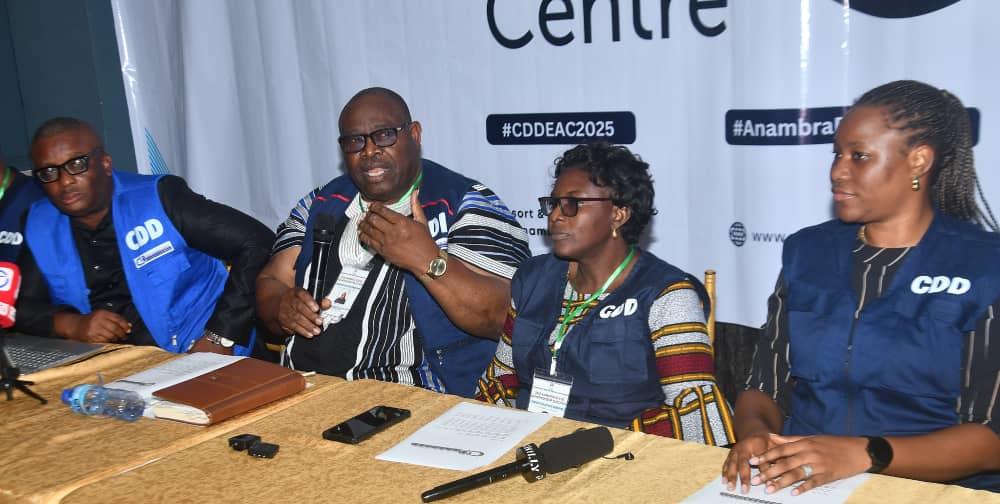Listen to the article
Nigeria’s democracy watchdog, the Centre for Democracy and Development (CDD–West Africa), has issued a warning about potential challenges that could undermine the upcoming Anambra State governorship election scheduled for November 8.
In an assessment presented at the launch of its Election Analysis Centre in Awka on Friday, the organization highlighted concerns over low electoral competition, increasing disinformation, and weakening public confidence in democratic institutions.
The election represents a significant milestone as the first off-cycle poll under the leadership of the new Independent National Electoral Commission (INEC) Chairman, Prof. Joash Amupitan. With over 2.8 million registered voters and an impressive 98.8% Permanent Voter Card collection rate, the technical foundation for robust participation exists. However, CDD analysts predict voter turnout may still fall below expectations.
“The 2025 Anambra governorship election is more than a sub-national poll. It is a test of Nigeria’s democratic integrity,” CDD stated, framing the election as a critical barometer for measuring the health of electoral processes nationwide.
The democracy think tank released two comprehensive pre-election reports during the event: “Anambra 2025: A Barometer of Party Fortunes, Federal Might and Personalities” and “Evaluating Disinformation Risks Ahead of the 2025 Governorship Election in Anambra State.” These reports outline several concerning trends that could impact election outcomes.
While acknowledging INEC’s improved preparations, CDD pointed to public skepticism stemming from logistical problems observed during the Continuous Voter Registration exercise. The organization also criticized delays in judicial decisions regarding candidate eligibility, noting that such administrative bottlenecks erode trust in electoral institutions.
Internal fractures within Nigeria’s major political parties have diminished their ability to mobilize voters effectively, according to the report. This party fragmentation has reduced the competitive nature of the election, potentially undermining the quality of democratic choice available to voters.
Security concerns loom large in several parts of the state. The report identified Ihiala, Nnewi South, Orumba South, and border communities such as Lilu, Azia, and Amorka as potential flashpoints. CDD cited inadequate oversight of local vigilante groups and persistent violence in these areas as factors that could depress voter turnout. The organization urged security agencies to maintain professionalism and neutrality throughout the electoral process.
The assessment also raised concerns about an uneven playing field for candidates. The ruling All Progressives Grand Alliance (APGA) and the incumbent governor reportedly enjoy significant advantages in visibility and resource mobilization. A controversial N50 million billboard permit fee imposed by the Anambra State Signage and Advertisement Agency has been criticized for limiting campaign access for smaller parties, despite the N1 billion expenditure ceiling established by the Electoral Act 2022.
Perhaps most troubling is CDD’s analysis of information manipulation tactics. The organization identified seven primary patterns of disinformation, including false allegations of security bias, exploitation of religious tensions, weaponization of insecurity narratives, and gender-based attacks targeting female candidates.
To counter these challenges, CDD has deployed an extensive monitoring network consisting of 178 trained observers, 57 grassroots “Soldiers of Mouth” monitors to track and debunk misinformation, and 30 mandate protection observers to document electoral irregularities in real-time.
The report also highlighted persistent inclusivity gaps. Only two female candidates, both representing smaller parties, are contesting the election, while accessibility for persons with disabilities at polling stations remains inadequate.
CDD concluded its assessment with a series of recommendations for key stakeholders. It called on INEC to maintain neutrality and ensure efficient deployment of voting materials and technology, urged security agencies to provide non-partisan protection for voters, and implored political parties to reject vote-buying tactics and maintain peaceful conduct. The organization also emphasized the responsibility of media outlets and civil society groups to promote factual information and inclusivity.
The CDD Election Analysis Centre will operate throughout the election period, serving as a hub for monitoring narratives, verifying information, and countering disinformation in real-time.
Fact Checker
Verify the accuracy of this article using The Disinformation Commission analysis and real-time sources.




8 Comments
Disinformation campaigns can be very damaging to the integrity of elections. I hope the election commission and civil society groups have robust strategies in place to identify and counter false narratives. Voter education will be crucial.
The high voter registration rate is a positive sign, but the predicted low turnout is troubling. Nigeria’s democracy needs robust participation to function effectively. I hope the election commission and civil society groups can address the issues highlighted in this analysis.
Agreed. Maintaining strong democratic institutions and public trust is vital, especially for pivotal elections like this one. Transparent and inclusive processes will be key to a credible outcome.
Weak political competition is a worrying sign. A diversity of viable candidates and platforms is essential for healthy democracy. I hope the Anambra election can demonstrate Nigeria’s ability to foster a robust political landscape.
The Anambra election will be an important test case for Nigeria’s democratic resilience. I’m curious to see if the new INEC leadership can help restore public faith in the electoral process. Strong, independent observation will be vital.
This is an important report highlighting some of the key challenges facing Nigeria’s democracy. Maintaining free and fair elections is crucial, not just for Anambra but for the country as a whole. I hope the authorities take these concerns seriously.
As a resource-rich country, Nigeria’s political landscape and governance have major implications for the mining and energy sectors. I’ll be following this election closely to see how it impacts the business environment and investment climate.
This is a concerning report on the potential challenges facing the upcoming Anambra gubernatorial election. Weak political competition and disinformation are worrying trends that could undermine public confidence in the democratic process. Careful monitoring and mitigation efforts will be crucial.